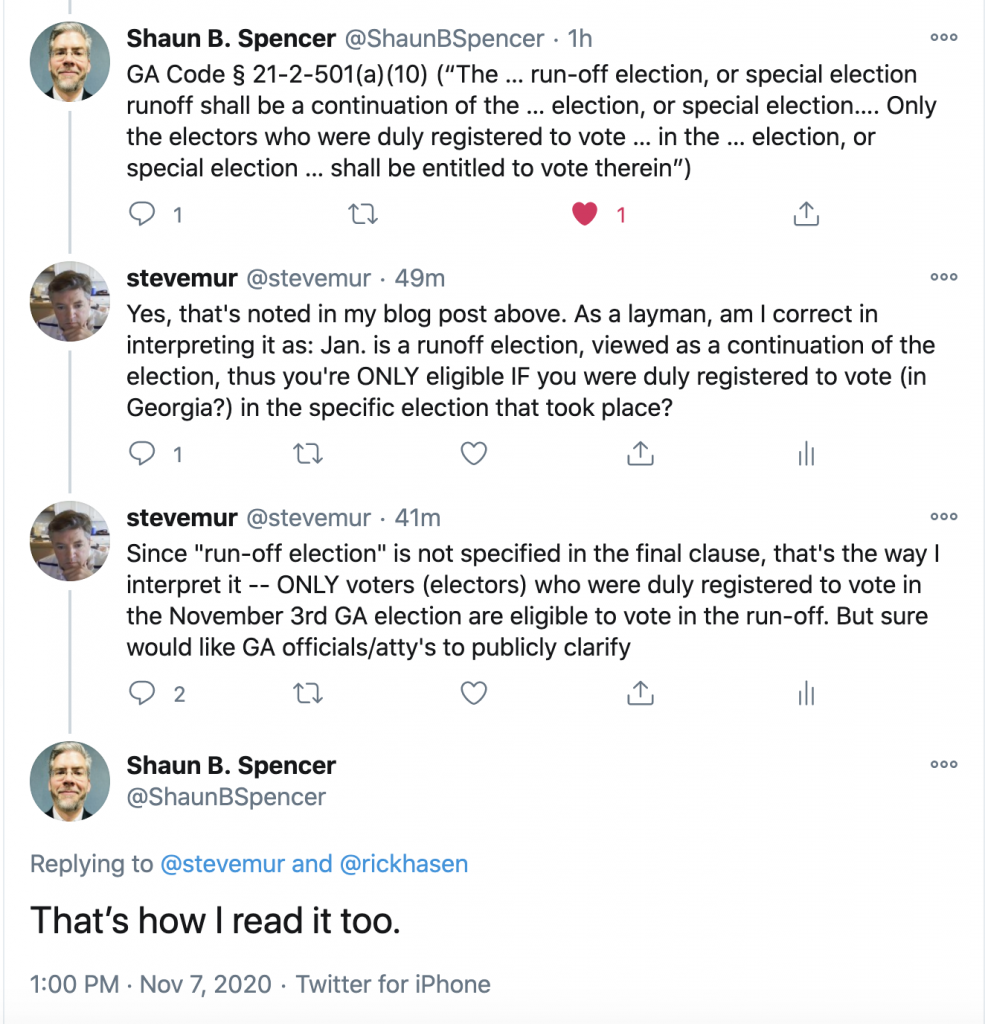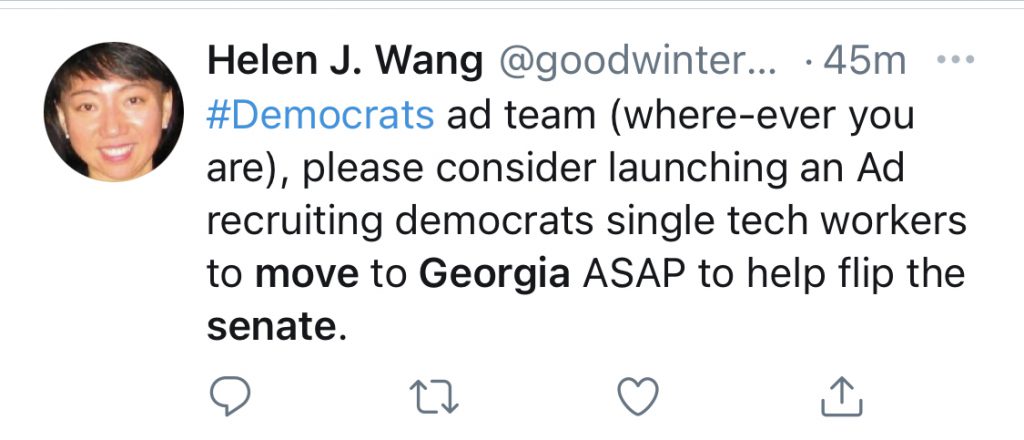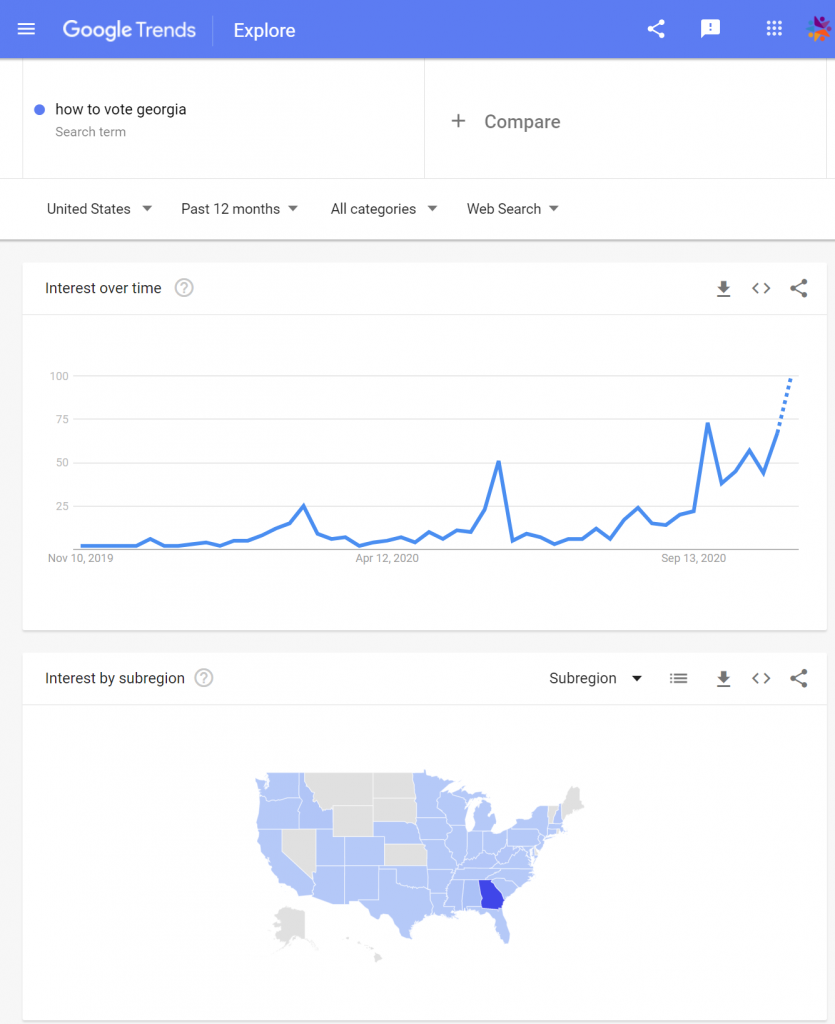Author’s Note
This post was written with precisely the same motive, curiosity and sense of urgency as that of an ethical hacker, who thinks he might have stumbled upon a gaping and important vulnerability in an operating system.
That vulnerability, in a nutshell, is this: “Move” to and register to vote in the Georgia run-off elections, swinging the balance of the US Senate your way. Seems simple, right? I do not advise it. It might not be legal (see update below), nor do I think it is ethical. But soon after I posted this on November 6th, I saw posts calling for it social media, and I even saw bestselling author Tom Friedman go live on CNN to promote this. It’s also being advocated in at least one regional newspaper in the Pacific Northwest.
Such a vulnerability can be easily exploited by either party, easily organized by the NRA or George Soros or a Koch brother, or right-to-lifers or whomever your ideological boogeyman is. Thus, this post is not intending to make an ideological statement toward or against any party, but rather a warning, to help preserve or improve the integrity of a very consequential election. This post reflects a very strong desire that, come January, America be assured that the Georgia election and thus United States Senate balance of power were each duly and legally decided, not simply by who organized the best inbound false (and many would say fraudulent) “move” campaign. Far better to head off potential fraud before it can happen.
UPDATE, November 6th, 3:20PM PT
Since the original publication of this post on November 6th 2020, I’ve seen social media discussion crop up elsewhere about this issue. Several are pointing out that it appears from GA Code 21-2-501(a) 10 that you are apparently only eligible to vote in the Georgia run-off election IF you were registered to vote in the Georgia November 3rd General, or if you are a newly eligible 18 year old Georgia resident who turns 18 before January 5th.
For instance, see this exchange on Twitter:

I have reached out to Georgia election officials (including the Georgia Secretary of State) to clarify, AND ask that they publicly clarify. If that’s the correct interpretation of Georgia statutes, and if this is enforced by checking ballots for the runoff to check that they WERE in fact registered or eligible to be registered for the November Georgia election(s) — i.e., a Georgia resident THEN, not now — that’s great, and makes the gist of my piece below irrelevant. In fact, it’s very much along the lines of one possible remedy I’ve proposed below.
Personally, however, after the third re-read of the relevant statutes (linked below), I still find them somewhat ambiguous in this requirement, and would like clarity from a Georgia election attorney or government official who knows, because I think this would better inform the public about what is and is not allowed BEFORE the votes are cast.
There is also in GA 21-2-217 the specific requirement about residency — you cannot have intent to move therefrom:
“(1) The residence of any person shall be held to be in that place in which such person’s habitation is fixed, without any present intention of removing therefrom;” and
“(3) A person shall not be considered to have gained a residence in any county or municipality of this state into which such person has come for temporary purposes only without the intention of making such county or municipality such person’s permanent place of abode;”
Interpretation: If any intent is found to only be there temporarily, such Georgia residency is void, and perhaps retroactively void as well, thus inviting fraud charges, as you are voting without actual residency.
I would happily update this post with more complete, expert info. You can reach me by replying to the post below, or at @stevemur on Twitter. Regardless, as the confines of the law are unclear/ambiguous to me, I suggest caution in interpreting the below. If you do decide to proceed anyway, there are certainly risks that you may be subject to a court proceeding in the future, I suppose, as those ballots/registrations will likely be very heavily scrutinized by whichever party “loses” the election, and it will be trivial to discover who registered after the general but still in 2020.
Here’s my original post:
——————
November 6, 2020, 9:00AM PT: The Georgia State Legislature and Secretary of State should act with urgency to recognize and if possible close what appears to be a major loophole for potential voter fraud for the upcoming January 5th, 2021 Senatorial runoff elections.
Unless they act, there is strong likelihood that the balance of power in the US Senate will be decided not by current Georgia residents but by many new voters not in Georgia today.
There is an enormous incentive to flock to the state between now and January 5th to establish temporary “residency,” vote, get the party control desired for the US Senate, and then “change one’s mind” to return to one’s actual, de-facto state of residence. Best as I can tell, it can be done in a matter of a few days.
Sound far-fetched? As our new president likes to say: not a joke, folks. Calls to do precisely this are already coursing through social media as I write this, some from blue checkmarks. Since when was the far-fetched out of the realm of possibility for 2020? How much does actually getting an agenda that’s been talked about for two years or more actually matter?
You can see just a few of these ruminations below; I’d expect the TikTok and Instagram campaigns have already launched in nascent form.
Balance of the US Senate may well depend not upon today’s Georgia voters, but potentially just a few thousand brand new voters who aren’t even in Georgia as I write this, who can and likely will come to the state temporarily simply to shift the vote to their favored party… and then depart.
Does this sound like a restoring-confidence-in-legislative process move, or one which will further undermine trust in our lawmaking institutions?
All it takes is a catchy TikTok or social media campaign (or RNC or NRA email blast), the ability to continue to remotely work for a few weeks (is anyone remote-working these days?), a cheap sublet, maybe a few reimbursement dollars from unscrupulous parties, time to sign up for and print out a utility bill, and boom — Senate control appears to be yours, for whichever party you choose.
How about #vanlife for a few weeks, anyone? Hell, even self-organizing clusters of Georgia “hosts” could easily emerge on social media, calling for warm bodies, making the process cheap, quick and simple. Get ready for a factory here unless legislation and transparency stops it. Already, clarion calls for unscrupulous activity have sprung up on social media, even from blue checkmarks. This is NOT the way this should be decided.
From my layman’s point of view, this should be illegal.
Or at the very least, claims of residency should be scrutinized closely, via a fair and transparent process. I am not encouraging people to do this. Do NOT do this. Voter fraud can be a felony in some situations. I am flagging it as an issue that Georgia’s legislators and Secretary of State should urgently examine, and consider a real “attack vector” in the incredibly consequential Georgia Senate Runoff Elections this January and thus the confidence of the US Senate for the next two years at a minimum.
I raise this warning as an independent voter who wants to know that the January 5th election was fairly decided. I am not registered with either political party. I could easily see actors from each party mobilizing to do this. So consider me an “ethical hacker” who is alerting a government of a major security flaw in their application software.
Though I’m not a lawyer, a cursory look at the Georgia state voter registration forms and residency requirements appears to make all this perfectly legal. But again, do not take my word for it. It is of course a felony to misrepresent your status.
What will we say in three short months if, hypothetically, the January 5th turnout in Georgia greatly exceeds the 7.2 million registered voters known in Georgia as of November? Or what if turnout is markedly higher (e.g., 30%+) than in the general election just a few weeks prior?
What if this flood of new voters flips the Senate, enabling or preventing a legislative agenda?
Will America believe that the balance of the US Senate was fairly decided, and that the potentially sweeping agenda, affecting everything from how the Senate passes laws (legislative filibuster) to the number Supreme Court justice seats and who occupies them has a duly-elected, fairly decided mandate?
Look, just this past Tuesday was the national election. There’s a lot of focus on the presidency. Let me dispense with that, because that’s not what this is about. Personally, I think Biden was duly elected president, and I think Trump is wrong and irresponsible to undermine faith in the presidential election with the words he’s using and actions he’s taking. I commend Biden for staying patient and reserved. I hope a Biden/Harris administration can in fact bring us together, as he’s repeatedly said he would work tirelessly to do. However, he will not be aided by a Senate majority that’s deemed illegitimate by well over half the electorate.
For the Shady, It’s the Best Political Return On Investment In Years
Today, as I write this on November 6th 2020, never in my lifetime have political dollars or energy had a higher potential return on investment. In the past two years, people have marched nightly for far less certain a return. Smashed and set fire to buildings for less likelihood of structural change. Spent literally billions of dollars for far less (hello Mike Bloomberg.) If you think people wouldn’t do this because it’s a hassle for a few weeks, or shady or unethical or fraudulent (even if perhaps to this layman it doesn’t appear to be, in the legal sense of the word), let me remind you that everything has been a hassle in 2020. And TikTok and Instagram movements are real, as past empty stadiums can attest.
What’s more, people abound who would happily enjoy few paid or unpaid weeks in warm weather, work remotely from Athens, Atlanta or Savannah, print an online utility bill and file some paperwork to get their agenda cemented. Existing Georgia voters, be damned.
If you think this is all fine and legal and “may the biggest bus win,” then you have a different interpretation of the words “voter disenfranchisement” than I do.
If such voter registration activity in Georgia is not overseen or examined with greater scrutiny and trust, it will further undermine faith not just in Georgia but in the entire United States that our legislators and thus our laws were not duly and justly established. At a time when we desperately need more faith in institutions, not less, someone needs to examine this closely, and both create and oversee a plan to ensure both Georgia’s voters and the State of Georgia are represented in the Senate via a fair election process. That is to say, let’s curtail fraudulent activity before it begins. Let’s not regret this in January.
Possible remedies are for the Georgia State legislature to pass a law which says you must be a resident of the state for more than X amount of time before voting, or that you may only vote in the runoff election if you voted in the November general, or some other requirement(s) which limit the inbound vote-swaying activity between November and January while also perhaps allowing for truly “legitimate moves” to be appealed, or something. Other remedies are considered below. They’re far from a complete list of options.
I’m not a legislator. I don’t know how to thread the needle in such a way that protects the “good, well-intentioned, seriously I just-moved-here residents” from those who are simply cynically gaming the system and will leave as soon as January’s election is decided. Personally, I see no way where one or the other group cannot be harmed. So I think the fairer and more just tradeoff is to err on the side of protecting existing Georgian voters that were legally registered as of November 3, 2020. They choices they made have been narrowed, and they should be the ones to choose who wins, without massive outside manipulation.
Regardless of outcome, as an informed citizen, I’d like to know that someone at least has looked into it, come January 6th, so that we don’t have two to four years of questioning the very legitimacy of any laws passed by that Congressional session.
Background
With all eyes fixed on the presidential election, the under-told story is that of the United States Senate. At this writing, it looks like it will be 48 R’s, 48 D’s, 2 independents, and 2 runoff Senators from Georgia.
By Georgia law, if no Senator passes a 50% threshold, a runoff election is held. And at this writing, it looks like neither Senator will cross that line. So, a January 5th 2021 election will decide not just one but two Senate seats. If they both go Democrat, it’s Leader Schumer, with Vice President Kamala Harris breaking any 50-50 tie. If they are split or both go Republican, it’s Leader McConnell. Anyone following US politics knows these outcomes are very different. One keeps the filibuster, one probably does not. One could expand the court, one probably would not. One might be able to enact Medicare for All, one probably would force a compromise.
In fact, there’s probably never been a better “return on investment” of political spending dollars nor voter registration drives. From my read, new registered voters or “residents” of Georgia don’t even need to come from within the state, and they certainly don’t have to stay past January 5th.
It’s Happened Before.
More than one friend has already chided me for being conspiratorial by pointing out this is not only possible, but likely. But did you know this kind of activity is not imaginary? It’s happened before, when the stakes were much smaller.
Do you remember that moment in the Netflix docuseries Wild, Wild Country, when voters were bussed in to the tiny town of Antelope, Oregon, so that the Rajneeshis could take over the city council? That very same activity appears to be fully legal and is a gaping hole for potential voter fraud.
People are already advocating for it on social media



Watch These Google Trends
Here’s a key Google Trend to watch: “How to vote Georgia”:

Or “register to vote Georgia”. Or “Georgia residency.” Watch those Google Trends over the next few weeks. What do we make of it if it shoots way up? Existing Georgia residents, despite a prominent, highly contentious national election, suddenly get a brand new desire to vote? Georgia residents suddenly turn voting age? Or could it be that manipulation is afoot — that people consider the Senate control important, and are willing to temporarily establish residency in the Peachtree State, to effect one of the most consequential agendas (or not) in their lifetime, when the stakes are clear, and will be decided in a matter of weeks?
It appears to be easy.
Checking some helpful websites, it sure doesn’t seem to take much to establish Georgia residency and register to vote in Georgia. By my cursory read, it can probably be done in a matter of a week or two.
Let’s put it this way — if I snapped my fingers, and you were on an episode of The Amazing Race, and I gave you, say, $3,000, how long would you need to get a valid Georgia utility bill with your name on it? A week or less? Walk into any cellphone shop and they’re delighted to sell you a phone. Go online and print it out. If you (and I) were unscrupulous enough to consider it and even risk illegal behavior to express our views under justification of “ends justify the means”, hell, it even looks like much of that process can be even done remotely.
You simply need to either get an address — e.g., sublet, and then procure a utility bill (e.g., print one online), OR get a drivers license in Georgia.
Note that I am NOT recommending you do this. I am flagging it as an issue for regulators to examine. Only by understanding the vectors of attack can oversight mechanisms be established.
Running some numbers
To calibrate this, even though it wouldn’t be necessary to sign a six month temporary sublet, let’s say that someone (pick your boogeyman — Soros, Koch brother, NRA whomever) wants to do this as verifiably as possible.
At a very generous estimate (let’s say, sharing an affordable flat for $800/month), every SURE THING vote would cost you about $400 * 6 months = $2400. And that’s without putting it back on the market come January 6th.
So even to be wildly conservative with an estimate, just $24 million would buy you 10,000 “sure-thing” votes — actually 20,000 sure thing votes because there are two Senate seats up for election. And that’s doing it by what appears to be — the book.
$240 million would buy you 100,000 sure thing votes. For reference, Mike Bloomberg spent $1 billion and ended up with 3 delegates from American Samoa. Which has a higher ROI? Do you really think people wouldn’t do this?
Either Party Can Do It
I am an independent voter. I am flagging this issue, and notifying legislators in Georgia and elsewhere, because I think there is a gaping hole here that will call the entire balance of the United States Senate legitimacy for the next two to four years into question if not closed and if, for instance, balance of power swings leftward in a miraculous upswing in new-to-the-state registrations.
This is not a partisan statement but a process and legal one. Take your pick of boogeymen: The remaining Koch Brother. George Soros. The NRA. Hell, the NEA. All you need to do is simply create a “Georgia temporary residency reimbursement fund”, and a hush-hush TikTok campaign and Instagram hashtag, encouraging people to “move” to Georgia for a few weeks after Thanksgiving, through December and early January. Is it legal? I don’t know, I’m not a lawyer, but it appears to be.
Boom, US Senate control is yours, Georgia voters be damned.
And those who take you up on this? They get sunshine, warmer weather during some of North America’s coldest months, that is, if they even choose to move there. Many people are remoting into work anyway, why not from a sublet in Athens, Savannah or Atlanta?
Remedies
I am not a legislator. I do not know what’s best to implement to give Georgia citizens and the larger country the assurance that the Senate races were duly decided. Each come with tradeoffs, but I’d argue, those tradeoffs are likely worth it. Options include but are not limited to:
- Require any voter in a runoff election to have voted in the general election
- Require a length of time before someone can go from establishing residency to voting in that state (if, say, eligible to vote in another state perhaps)
- Extend the requirements for proof of residency and duration of same
- Move UP the registration deadline for the special elections to some time as soon as possible
- … other options
Before you argue that each of the above are “voter disenfranchisement” or “suppression”, please be sure that you do the same calculus without those assurances or safeguards for voters who are legitimately registered voters in the State of Georgia today as I write this, November 6th 2020. Should their votes and voice be diluted by those temporarily inbound?
UPDATE — Statutes
Since publishing this blog post, a friend pointed me to the Georgia Code here, with clause (10), which I’m still trying to interpret. Boldface added for clarity, but I’m still having trouble disambiguating what it’s saying here:
(10) The run-off primary, special primary runoff, run-off election, or special election runoff shall be a continuation of the primary, special primary, election, or special election for the particular office concerned. Only the electors who were duly registered to vote and not subsequently deemed disqualified to vote in the primary, special primary, election, or special election for candidates for that particular office shall be entitled to vote therein, and only those votes cast for the persons designated as candidates in such run-off primary, special primary runoff, run-off election, or special election runoff shall be counted in the tabulation and canvass of the votes cast. No elector shall vote in a run-off primary or special primary runoff in violation of Code Section 21-2-224.
Statute of Georgia, Ga. Code § 21-2-501
And also, following the referenced 21-2-224, note that 21-2-224 includes this requirement:
(1) If such special primary or special election is held in conjunction with a general primary, general election, or presidential preference primary, the registration deadline for such special primary or special election shall be the same as the registration deadline for the general primary, general election, or presidential preference primary in conjunction with which the special primary or special election is being conducted; or
(2) If such special primary or special election is not held in conjunction with a general primary, general election, or presidential preference primary but is held on one of the dates specified in Code Section 21-2-540 for the conduct of special elections to present a question to the voters or special primaries or elections to fill vacancies in elected county or municipal offices, the registration deadline for such a special primary or election shall be at the close of business on the fifth Monday prior to the date of the special primary or election or, if such Monday is a legal holiday, by the close of business on the following business day.
Is this saying that you must be a registered voter in the November general to vote in the run-off? I don’t read it that way. Rather, clause 21-2-224: (2) seems to suggest that the real registration deadline is December 7th, a day which may live, once again, in infamy.
Statute 21-2-217 makes several important points about residency:
(1) The residence of any person shall be held to be in that place in which such person’s habitation is fixed, without any present intention of removing therefrom;
(5) If a person removes to another state with the intention of remaining there an indefinite time and making such state such person’s place of residence, such person shall be considered to have lost such person’s residence in this state, notwithstanding that such person may intend to return at some indefinite future period;
(15) For voter registration purposes, the board of registrars and, for candidacy residency purposes, the Secretary of State, election superintendent, or hearing officer may consider evidence of where the person receives significant mail such as personal bills and any other evidence that indicates where the person resides.
I’d love to get an attorney’s opinion.
Update: Tom Friedman Calls for Precisely This Kind of Sketchy/Fraudulent Activity on National TV
Note that according to GA Code Title 21 Chapter 2 Article 6 (21-2-217), unless you have the intent to live their permanently, that’s not residency — it’s fraud, and could subject you to court proceedings down the line, as ALL of these registrations are very likely to be closely scrutinized by a team of attorneys from the losing party.
UPDATE Dec 2 2020 – Florida Attorney Under Investigation
Florida Attorney and GOP member Bill Price is under investigation for encouraging voters to register to vote in Georgia. See more from WSB-TV Atlanta.
People You Might Want to Contact
If you agree with me that this is NOT a good situation and would further undermine our already tenuous faith in institutions, here are some people you might wish to contact:
Governor of Georgia
Georgia General Assembly
Leader: Lt. Governor (President of the Senate) Geoff Duncan, 404 656-5030, @GeoffDuncanGA
President pro tempore: Senator Butch Miller
321 State Capitol
Atlanta, GA 30334
Office: (404) 656-6578
Brad Raffensperger, Georgia Secretary of State @BradforGeorgia
214 State Capitol
Atlanta, Georgia 30334
844.753.7825
Update, November 15 2020
Georgia Secretary of State Brad Raffensperger issued a warning on Friday to anyone out-of-state looking to vote in the Jan. 5 runoff election for Senate. He says moving to the state with the sole purpose of voting and leaving is illegal, and considered voter fraud.
Per O.C.G.A § 21-2-561, it is a felony to register to vote in Georgia if you are not a resident of Georgia with no intention of leaving and is punishable by up to 10 years in jail and a $100,000 fine.
“Let me be clear, those who come to Georgia with the intention of voter fraud will be prosecuted,” said Secretary Raffensperger. “We thoroughly investigate every single allegation of voter fraud. Anyone is welcome to move to the state named the No. 1 place to do business. However, let me warn anyone attempting election mischief: If you illegally participate in our elections, you might be spending a lot more time in Georgia than you planned.”
….
“Anyone moving to our state to attempt to illegally influence the election could face a hefty fine and the possibility of up to 10 years behind bars,” said Deputy Secretary of State Jordan Fuchs. “Do you value your freedom? If so, don’t commit voter fraud in Georgia.”
More from WTOC local news.

